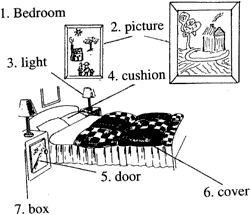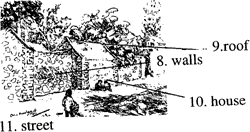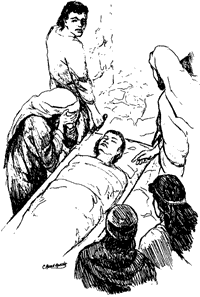Unit 13: Negatives
Negatif
Pictured Words
Kata benda konkret
New Words
Kata baru

| 1. bedroom
1. kamar tidur |
| 2. picture
2. gambar |
| 3. light
3. lampu |
| 4. cushion
4. bantalan |
| 5. door
5. pintu |
| 6. cover
6. selimut, penutup |
| 7. box
7. kotak |

| 8. walls
8. tembok |
| 9. roof
9. atap |
| 10. house
10. rumah |
Nouns
Kata benda
Kepercayaan
bagian depan
Pendapat
Siapa
Gerbong
Buah-buahan
perhentian
Diskusi
pertolongan
Rentangan
Ketakutan
Pengetahuan
Pikiran
Perasaan
Bibir
Kegunaan
Adjectives
Kata sifat
Bengkok - lurus
Bersih - kotor
Umum
Terang - gelap
Datar
Baru
Miskin
Structure Words
Kata struktur
Awal
Bagaimana
Mengapa
Sayings
Perkataan
Is not this a poor house?
Tidakkah rumah ini reyot?
Let me see a new house, please.
Izinkan saya melihat rumah baru.
There is one over there.
Ada satu di sebelah sana.
That one.
Yang satu itu.
This is not a new house.
Ini bukan rumah baru.
How much is it?
Berapa harganya?
May I not put the light on?
Tidak bolehkah saya menyalakan lampu?
The light is over there.
Lampu ada di sebelah sana.
Has not the bed a nice cover?
Tidakkah tempat tidur itu dilapisi penutup yang cantik?
Other forms of the negative
Bentuk negatif yang lain
There are other ways of saying the negative.
Ada cara lain untuk mengatakan pernyataan negatif.
In statements with the verb "to be" the word "not" may be put with it:
Dalam pernyataan dengan kata kerja "menjadi (to be)" kata "tidak" bisa ditambahkan:
Am I not to get you a place?
Tidak bisakah saya menemukan tempat bagimu?
Is there not Boaz?
Apakah Boas tidak ada?
These are negative questions.
Contoh di atas adalah pertanyaan negatif.
If we make them into negative statements they would be:
Jika kita menjadikannya pernyataan negatif maka:
I am not to get you a place
Saya tidak akan menemukan tempat bagimu
There is not Boaz
Boas tidak ada
In each statement, "not" makes it negative.
Di masing-masing pernyataan, "tidak" menjadikannya negatif.
Negatives with the verb "to have" also do the same thing as those with the verb "to be":
Negatif dengan kata kerja "mempunyai" juga melakukan hal sama sebagai yang itu dengan kata kerja "menjadi":
Naomi had a relation
Naomi memiliki seorang kerabat
Naomi had not a relation
Naomi tidak memiliki seorang kerabat
These statements are opposites.
Kedua pernyataan ini saling bertolak belakang.
The first is positive and the second is negative.
Yang pertama positif dan kedua negatif.
Negative statements in the Present time (Tense) are made by using "do":
Pernyataan negatif di waktu Sekarang (Tense) dibuat dengan menambahkan "do":
but do not let him see you
Tetapi jangan biarkan dia menemuimu
do not go back to your mother-in-law with nothing in your hands.
Jangan kembali ke ibu mertuamu dengan tangan hampa.

The Widow's Son
Putra Seorang Janda
And it came about, after a little time, that he went to a town named Nain;
Dan tidak lama setelahnya, Dia tiba di sebuah kota bernama Nain;
and his disciples went with him, and a great number of people.
Dan para murid-Nya pergi bersama Dia dan diikuti orang banyak.
Now when he came near the door of the town, a dead man was being taken out, the only son of his mother, who was a widow;
Ketika Dia mendekati gerbang kota, seorang pria yang telah meninggal sedang diusung keluar, ia adalah anak tunggal dari seorang janda;
When the Lord saw her, he had pity on her and said to her, Be not sad.
Ketika Yesus melihat itu, dia merasa iba atas janda itu dan berkata kepadanya, jangan sedih.
And he came near, and put his hand on the stretcher where the dead man was: and those who were moving it came to a stop.
Dan Dia menghampiri dan meletakkan tangan-Nya pada usungan dan mereka yang sedang mengusung berhenti.
And he said, young man, I say to you, Get up.
Dan Dia berkata, Anak muda, Aku perintahkan dirimu, bangunlah.
And the dead man got up, and words came from his lips, And he gave him to his mother.
Dan pria yang telah meninggal itupun bangun dan berkata-kata. Dan Yesus membawa pria itu kepada ibunya.
Fear came on all, and they gave praise to God, saying, A great prophet is among us: and, God has given thought to his people.
Ketakutan menghinggapi semua orang, dan mereka memuji Allah, kata mereka, seorang nabi luar biasa ada di tengah kita: dan, Allah telah memperhatikan umat-Nya.
Additional Reading
Bacaan tambahan
The story of the Widow's Son comes to us from Luke who was a medical man and so we can think of his discussion as a responsible account of what took place there on that day.
Kisah Putra Seorang Janda dikisahkan oleh Lukas yang adalah seorang tabib dan oleh sebab itu kita yakin bahwa catatannya sungguh menceritakan apa yang terjadi pada hari itu.
In fact he makes use of some words which only a medical man could have knowledge of.
Bahkan dia menggunakan beberapa istilah yang hanya bisa dipahami oleh seorang tabib.
Even today, there is a place there for putting dead persons into holes among the rough stones and that is where the great number of people were going with the body of the dead boy.
Sekarang ini, ada tempat untuk menaruh jenazah di dalam lubang di antara bebatuan alam dan disanalah orang banyak hendak menguburkan anak lelaki itu.
The group would be loud in their cries and very sad, for that was usual with death.
Rombongan itu tentu saja menangis dengan keras dan sangat sedih, dan itu wajar ketika ada kematian.
It was the opinion of every one then that to put your touch on a dead man's carriage made you unclean, but Jesus did just that.
Adalah aturan umum yang berlaku ketika itu bahwa menyentuh kereta orang meninggal menajiskan seseorang, tetapi Yesus justru melakukan itu.
So everyone stopped, of course.
Oleh sebab itu semua orang berhenti.
The place was near where the prophet Elisha gave new life to the boy that we had a story about in Unit 6: "On a Very Hot Day".
Tempat itu terletak dekat tempat dimana nabi Elisa membangkitkan anak lelaki yang dimuat dalam unit 6: "Pada Hari yang Sangat Panas".
This miracle therefore had special value to persons there.
Keajaiban itu sungguh bernilai bagi penduduk di sekitar sana.
They would hold the story of Elisha very dear to them, and that would have been another reason why they were saying, "A great prophet is among us: and, God has given thought to his people".
Mereka tidak akan melupakan kisah Elisa, dan itulah sebabnya mengapa mereka berkata, "seorang nabi luar biasa ada di tengah kita: dan, Allah telah memperhatikan umat-Nya".
The important point, however, is that the prophet Elisha stretched himself seven times on the body of the boy, but Jesus only said "Get up" and the boy sat up.
Yang penting adalah bahwa nabi Elisa membaringkan dirinyanya tujuh kali di atas tubuh anak lelaki, tetapi Yesus hanya berkata "bangunlah" dan anak lelaki itupun bangun dan duduk tegak.
So, in the eyes of the people it was a much greater miracle.
Oleh sebab itu, di mata orang banyak itu adalah keajaiban yang jauh lebih luar biasa.
Jesus was very kind.
Yesus sangat baik.
The word that was made use of with respect to his feelings has the idea of "being deeply moved in his heart".
Kata yang digunakan untk menunjuk pada perasaan-Nya menggambarkan "hatinya sungguh tergerak ".
So this story gives us some idea of how truly kind he was.
Oleh sebab itu kisah ini memberikan gambaran betapa baiknya Yesus.
He did this to give help to the widow who would be completely dependent upon her son for her needs.
Dia melakukan ini untuk menolong janda yang sangat bergantung kepada putranya untuk mencukupi kebutuhan hidupnya.
He was not making himself seem important.
Dia tidak menjadikan dirinya terlihat penting.
This story also has relation to a belief held by many people in those times.
Cerita ini juga berhubungan dengan kepercayaan yang dianut oleh banyak orang ketika itu.
They thought that God had no sense of feeling.
Mereka berpikir bahwa Allah tidak berperasaan.
But, Jesus let it be known by his act that God was very conscious of the needs of men.
Tetapi, Yesus membuktikan melalui perbuatan-Nya bahwa Allah sungguh memahami kebutuhan manusia.
Helpful Notes
Catatan penolong
| pity
iba | having sadness of heart.
kesedihan hati. |
| miracle
Mukjizat | something not often seen.
sesuatu yang jarang dilihat. |
| stretcher
usungan | a thing to take rest on.
alat untuk membaringkan. |
| responsible
Bertanggung jawab | having a good relation with others.
memiliki hubungan baik dengan orang lain. |
| account
Catatan | saying a story.
pernyataan mengenai sesuatu. |
| conscious
sadar | having knowledge of the things around one.
bisa memahami apa terjadi di sekitarnya. |